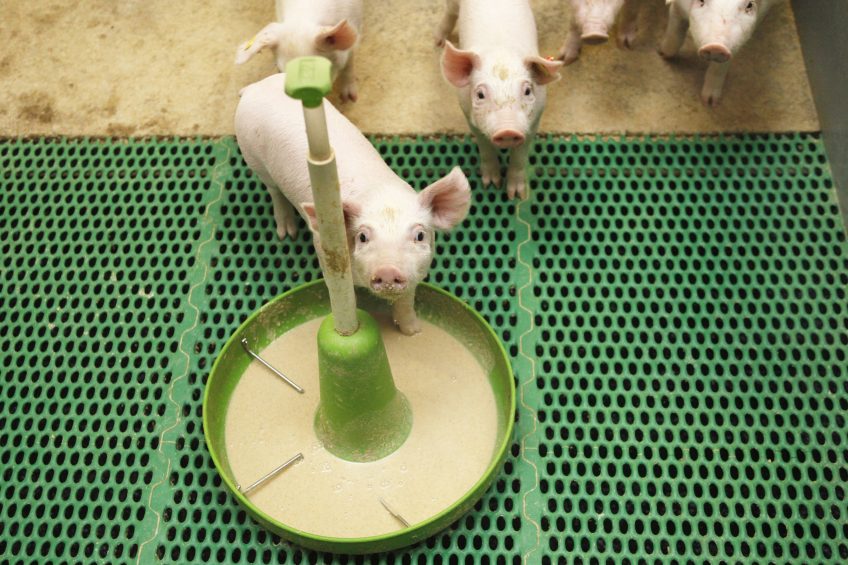Overcoming weaning stress in pigs

The ability of a healthy microbiome to overcome stress consequences is an exciting concept. Establishing and maintaining a healthy microbiome during weaning is therefore vitally important in reducing neonatal morbidity and mortality.
Given the link between early life stress and gastrointestinal diseases, it has been shown that early weaning stress can profoundly alter physiology responses by disrupting the homeostasis in the composition of the gut microbiome. The disruption of this symbiotic relationship, named dysbiosis, has been associated with alterations in the intestinal mucosal barrier functions. The compromised barrier function can aggravate post-weaning diarrhoeal diseases such as enterotoxigenic E. coli, rotavirus, and Clostridium difficile, leading to changes in intestinal morphology associated with high mortality and poor performance.
Healthy gut microbiota
To prevent gut health problems, dietary supplementation with feed additives represents an important alternative to promote animal health and performance. The composition and complexity of the digestive microbiota in post-weaning piglets strongly depends on time of weaning and the use of antibiotics or functional feed additives. On the one hand, feed additives promote microbiota complexity and maturation that positively affects the post-weaning intestinal barrier function. On the other hand, antibiotics and chemical additives have a negative effect on the microbiome (dysbacteriosis), decreasing its complexity and by disrupting its function and integrity.
Feed additives have gained considerable interest because of their ability to improve performance by sustaining a healthy gut microbiome through different physiological mechanisms. These may, in turn, maximise pig health and growth, whilst enhancing the efficiency of feed conversion. Their effects are most pronounced in young piglets, especially during the weaning period. However, several studies have demonstrated growth promoting effects in older pigs as well. Among the alternative feed additives, short and medium chain fatty acids (SCFA, MCFA), essential oils and botanical components probably represent the best potential to balance the gut health ecosystem during stress periods, promoting intestinal health and minimising disease risks in the absence of antibiotics or restricted chemical additives.
Precision delivery coated butyrate
Studies have shown that supplementation with sodium butyrate supports intestinal integrity, stimulates the proliferation and maturation of enterocytes, improves intestinal morphology, and strengthens the intestinal barrier function by boosting the expression of tight junction proteins. In addition, butyrate can trigger the expression of antimicrobial Host Defense Peptides (HDP’s) in the intestinal tract of animals, thereby limiting the growth of several enteric bacterial in general, including those related with post weaning diarrhoea. Butyrate can be used as protected or unprotected salt. Since several pathogens damage intestinal cells in the small intestine and in the hindgut, it is crucial that butyrate can reach these areas.
Butyrate can only arrive in the lower luminal parts of the intestinal tract when it is protected from metabolisation in the stomach and is gradually released in the distal regions of the intestine. There it can significantly reduce pathogen colonisation, improve growth performance and support immune response and intestinal morphology. The most efficient way to achieve this is by administering a protected butyrate with precision delivery capacity such as Adimix Precision. Different coated butyrate products are available for use in animal production, however one should make a clear distinction between high quality coatings that result in optimal protection and precision delivery of butyrate and coatings that are solely applied to cover the distinct butyrate smell.
Research from the University of Illinois demonstrated the importance of a high-quality coating. Weaning pigs were randomly allotted to three dietary treatments; control diet, control diet + 4kg/T of a smell coated butyrate (Na-butyrate) and control diet + 4kg/T of a precision delivery butyrate (Adimix Precision, Na-butyrate). There were 6 replicate pigs per treatment. Pigs were euthanised and the concentration of butyrate was analysed in samples from different parts of the intestinal tract. Weaning pigs fed the precision product had significantly higher (P < 0.05) concentrations of butyrate in the jejunum and ileum in comparison with both the control group and the group fed the smell coated butyrate. It could, therefore, be concluded that administration of high quality protected butyrate had the required target release capacity (Figure 1).
Effects in vivo
The effect of unprotected sodium butyrate or protected sodium butyrate supplemented to the diet, on performance, of Escherichia coli K88 (ETEC) challenged weaning pigs was investigated at the University of Bologna. Experimental diets were obtained with the addition of free or precision delivery Na-butyrate. The challenge with ETEC increased mortality in the control group and certainly had an impact on the growth rate of the piglets. The piglets receiving the free Na-butyrate in the diet showed a lower mortality rate and were to a lesser extent influenced in growth than the challenged control group. In the group of piglets offered the target released Na-butyrate none of the piglets died. In addition, the growth rate was improved compared to the control piglets, regardless of whether a challenge was applied or not (see Figure 2). To unlock the full potential of butyrate, it is crucial to assure its delivery in the right area. These results demonstrate that Adimix Precision can deliver butyrate to the areas most affected by stress at weaning.











